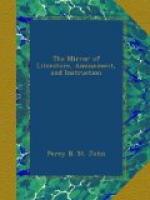* * * * *
HISTORICAL FACT.
During the troubles in the reign of Charles I., a country girl came to London, in search of a situation; but not succeeding, she applied to be allowed to carry out beer from a brewhouse. These females were then called “tub-women.” The brewer observing her to be a very good-looking girl, took her out of this low situation into his house, and afterwards married her. He died, however, while she was yet a very young woman, and left her a large fortune. She was recommended, on giving up the brewery, to Mr. Hyde, a most able lawyer, to settle her husband’s affairs; he, in process of time, married the widow, and was afterwards made Earl of Clarendon. Of this marriage there was a daughter, who was afterwards wife to James II. and mother of Mary and Anne, queens of England.
ZANGA.
* * * * *
LAWYERS.
In 1454, an Act of Parliament notices, “that there had used formerly six or eight attorneys only, for Suffolk, Norfolk, and Norwich together; that this number was now increased to more than eighty, most of whom being not of sufficient knowledge, came to fairs, &c. inciting the people to suits for small trespasses, &c. wherefore there shall be hereafter but six for Suffolk, six for Norfolk, and two for the city of Norwich.”
H.B.A.
* * * * *
THE DYERS.
Inscription on a Tombstone in a Churchyard at Truro, Cornwall.
A dyer born, a dyer bred,
Lies numbered here among the dead;
Dyers, like mortals doomed to die,
Alike fit food for worms supply.
Josephus Dyer was his name;
By dyeing he acquired fame;
’Twas in his forty-second year
His neighbours kind did him inter.
Josephus Dyer, his first son,
Doth also lie beneath this stone;
So likewise doth his second boy,
Who was his parents’ hope and joy.
His handywork all did admire,
For never was a better dyer.
Both youths were in their fairest prime,
Ripe fruitage of a healthful clime;
But nought can check Death’s lawless
aim,
Whosoever’ life he choose to claim:
It was God’s edict from his throne,
“My will shall upon earth be done.”
Then did the active mother’s skill
The vacancy with credit fill
Till she grew old, and weak, and blind,
And this last wish dwelt on her mind—
That she, when dead, should buried be
With her loved spouse and family.
At last Death’s arm her strength
defied;
Thus all the dyeing Dyers died!
* * * * *




